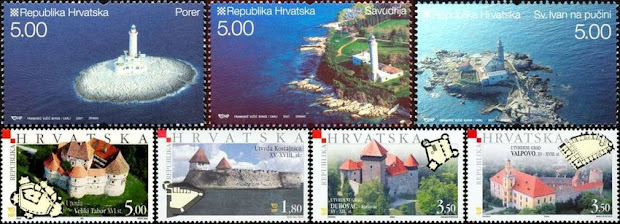"The term diaspora refers to the movement of any population sharing common ethnic identity who were either forced to leave or voluntarily left their settled territory, and became residents in areas often far remote from the former." Thus says Wikipedia and so I've always thought. Therefore, it strikes me as unusual to describe Croats living in Bosnia as "diaspora". Yet, this is very common in Croatia. Most of these Croats have lived in Bosnia for generations, for hundreds of years, very close to the Croatian border. Mostar is their unofficial capital.
 Bosnian Croats find themselves in a difficult and complicated situation. With the Muslims they form the Federation of Bosnia and Herzegovina, one half of Bosnia (the other half being the Republika Srpska). It is a loveless marriage, arranged by the "international community". Bosnian Croats number half a million, which is much less than both Serbs and Muslims. However, unlike the Muslims they have a fatherland outside Bosnia, so if Bosnia breaks up in the future (which seems rather likely) they have some place to go. Or Croatia will simply attach the Croatian part of Bosnia.
Bosnian Croats find themselves in a difficult and complicated situation. With the Muslims they form the Federation of Bosnia and Herzegovina, one half of Bosnia (the other half being the Republika Srpska). It is a loveless marriage, arranged by the "international community". Bosnian Croats number half a million, which is much less than both Serbs and Muslims. However, unlike the Muslims they have a fatherland outside Bosnia, so if Bosnia breaks up in the future (which seems rather likely) they have some place to go. Or Croatia will simply attach the Croatian part of Bosnia.
The Croatian homeland (diaspora Croats, be it in Bosnia or Australia, are often called "Hrvati izvan domovine", Croats out of the homeland), or rather the Sanader administration, has decided upon a new strategy towards Bosnian Croats. A Council for Croats outside of Croatia will be founded, presided by the Minister of Foreign Affairs, and a law to strengthen ties with Bosnian Croats will be send to parliament.
 "Children are Croatia's blessing", says the rundown facade of the Croatian Population Movement. One of the strategy's aims is to stop the downward demographic trend. Many countries face the problem of aging populations, but Croatia is in a particularly difficult situation. This country has an enormous number of pensioners, mostly laid-off people who got early retirement. Although a firmly catholic country, Croatia has a very low birthrate, despite financial support for parents and a generous pregnancy leave. Result: an annual population growth of minus 10.000.
"Children are Croatia's blessing", says the rundown facade of the Croatian Population Movement. One of the strategy's aims is to stop the downward demographic trend. Many countries face the problem of aging populations, but Croatia is in a particularly difficult situation. This country has an enormous number of pensioners, mostly laid-off people who got early retirement. Although a firmly catholic country, Croatia has a very low birthrate, despite financial support for parents and a generous pregnancy leave. Result: an annual population growth of minus 10.000.
 Bosnian Croats find themselves in a difficult and complicated situation. With the Muslims they form the Federation of Bosnia and Herzegovina, one half of Bosnia (the other half being the Republika Srpska). It is a loveless marriage, arranged by the "international community". Bosnian Croats number half a million, which is much less than both Serbs and Muslims. However, unlike the Muslims they have a fatherland outside Bosnia, so if Bosnia breaks up in the future (which seems rather likely) they have some place to go. Or Croatia will simply attach the Croatian part of Bosnia.
Bosnian Croats find themselves in a difficult and complicated situation. With the Muslims they form the Federation of Bosnia and Herzegovina, one half of Bosnia (the other half being the Republika Srpska). It is a loveless marriage, arranged by the "international community". Bosnian Croats number half a million, which is much less than both Serbs and Muslims. However, unlike the Muslims they have a fatherland outside Bosnia, so if Bosnia breaks up in the future (which seems rather likely) they have some place to go. Or Croatia will simply attach the Croatian part of Bosnia.The Croatian homeland (diaspora Croats, be it in Bosnia or Australia, are often called "Hrvati izvan domovine", Croats out of the homeland), or rather the Sanader administration, has decided upon a new strategy towards Bosnian Croats. A Council for Croats outside of Croatia will be founded, presided by the Minister of Foreign Affairs, and a law to strengthen ties with Bosnian Croats will be send to parliament.
 "Children are Croatia's blessing", says the rundown facade of the Croatian Population Movement. One of the strategy's aims is to stop the downward demographic trend. Many countries face the problem of aging populations, but Croatia is in a particularly difficult situation. This country has an enormous number of pensioners, mostly laid-off people who got early retirement. Although a firmly catholic country, Croatia has a very low birthrate, despite financial support for parents and a generous pregnancy leave. Result: an annual population growth of minus 10.000.
"Children are Croatia's blessing", says the rundown facade of the Croatian Population Movement. One of the strategy's aims is to stop the downward demographic trend. Many countries face the problem of aging populations, but Croatia is in a particularly difficult situation. This country has an enormous number of pensioners, mostly laid-off people who got early retirement. Although a firmly catholic country, Croatia has a very low birthrate, despite financial support for parents and a generous pregnancy leave. Result: an annual population growth of minus 10.000.




0 reacties:
Post a Comment